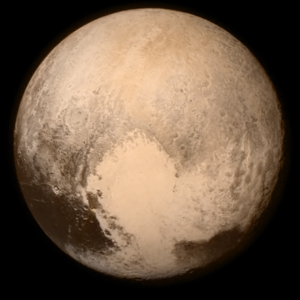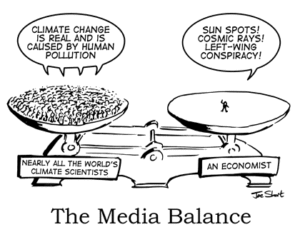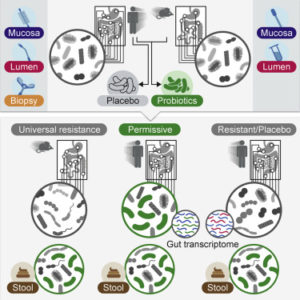Sep
11
2018
 If you have not watched Rick and Morty, I highly recommend it. It is an adult-themed cartoon, very entertaining, and extremely well written. On one episode Jerry, while trying to help his son Morty with a science project, mistakenly says that Pluto is a planet. When Morty corrects him, Jerry doubles-down and will not relent, going as far as to call NASA to insist that Pluto be reclassified a planet. This gets the attention of the Plutonians, who are themselves engaged in a raging controversy over whether or not Pluto is a full planet, and who enlist Jerry as an “Earth scientist” to support the planet position. This plot line is really a commentary on science denial, specifically global warming denial.
If you have not watched Rick and Morty, I highly recommend it. It is an adult-themed cartoon, very entertaining, and extremely well written. On one episode Jerry, while trying to help his son Morty with a science project, mistakenly says that Pluto is a planet. When Morty corrects him, Jerry doubles-down and will not relent, going as far as to call NASA to insist that Pluto be reclassified a planet. This gets the attention of the Plutonians, who are themselves engaged in a raging controversy over whether or not Pluto is a full planet, and who enlist Jerry as an “Earth scientist” to support the planet position. This plot line is really a commentary on science denial, specifically global warming denial.
The Pluto controversy back on Earth is less intense, and the stakes are lower, but it remains and interesting debate about how to optimally categorize things in science. What categories should we have, and what criteria should we use? Should scientific utility be the only measure, or should public understanding also play a role?
Pluto was discovered in 1930 by Clyde Tombaugh and was designated as the ninth planet. Pluto has always been, for some reason, a popular favorite, maybe because of the name, maybe because it was the smallest planet. Pluto has the most eccentric orbit of any of the classic 9 planets, and it’s orbit actually crosses over the orbit of Neptune. It is also the first Kuiper belt object discovered – a region of our solar system beyond Neptune that is full of icy objects.
Problems started for our nice planetary system when other Kuiper belt objects started to get discovered. In 2005 Eris was discovered – it is slightly smaller than Pluto but is 27% more massive (because it is more dense). Eris also has a moon, Dysnomia. Two other large Kuiper belt objects have since been confirmed and named – Makemake and Haumea.
Continue Reading »
Sep
10
2018
 In 2014 the BBC announced a policy change – that it would train its journalists to avoid false balance when reporting science news. This was a welcome policy change, but apparently execution has not achieved the desired results. In a recent training brief the BBC admits it often gets its science reporting wrong, falling for false balance. This is especially true when reporting on climate change.
In 2014 the BBC announced a policy change – that it would train its journalists to avoid false balance when reporting science news. This was a welcome policy change, but apparently execution has not achieved the desired results. In a recent training brief the BBC admits it often gets its science reporting wrong, falling for false balance. This is especially true when reporting on climate change.
Balanced reporting simply refers to the journalistic standard of fairly and proportionately representing all sides in a legitimate debate. This strongly applies to political reporting, where there are often literally two sides, and neither side is objectively right or wrong. Even when one side has the better case, many news outlets take a neutral journalistic stance, simply reporting what each side claims. They relegate taking a side to the editorial and opinion pages, while sticking to the facts in their news pages.
False balance refers to the practice of reporting two or more sides to a controversy as if they are equivalent when they are objectively not. This mostly applies to science reporting, where opinion plays far less of a role than politics. The BBC affirmed in 2014 what critics of mainstream science reporting have been saying for decades – good science journalism does not present all sides in a balanced way, but rather reports different views in a proportional way, depending on the consensus of scientific opinion. That is a far more accurate way to report science news.
So, if 99.9% of geologists and other scientists accept the consensus interpretation of the scientific evidence that plate tectonics is the only valid scientific theory regarding the dynamics of the Earth’s crust, science journalists should not feel obligated to report on the alternate theory of the hollow Earthers every time they report on a related news item. They also do not have to mention, every time they show a NASA photo or video of a spherical Earth, that there are those who contend the Earth is actually flat.
Continue Reading »
Sep
07
2018
 A new detailed study of the effects of probiotics on the gastrointestinal microbiome shows how complex this subject is. Unfortunately, the reporting is significantly oversimplifying the results. The BBC reports:
A new detailed study of the effects of probiotics on the gastrointestinal microbiome shows how complex this subject is. Unfortunately, the reporting is significantly oversimplifying the results. The BBC reports:
A group of scientists in Israel claim foods that are packed with good bacteria – called probiotics – are almost useless.
That’s not actually what they said, at least according to my read.
Probiotics are pills or foods that contain live friendly bacteria, which are meant to support the beneficial bacteria that live in our guts. This basic idea is not pseudoscience. It is quite reasonable – however, the science of probiotics is very immature. We are still in a phase where we are discovering more and more complexity, and struggling to find any clear therapeutic gains. Meanwhile, the marketplace is making claims that go way beyond the science, and is based on very simplistic notions of how the microbiome works.
In the last decade or so we have demonstrated that the microbiome is an ecosystem at homeostasis. People have about 100 bacterial species in their gut microbiome, which not only colonize their mucous membranes, they keep out other bacterial species. This is an important part of our immune defense – the microbiome prevents infection by harmful bacteria. Further, you can’t just throw one or a few species into an ecosystem and expect to change it.
Continue Reading »
Sep
06
2018
 Humans tend to be superstitious creatures, meaning that we sometimes believe in magical causation – if I wear my lucky sweater my favorite team will win. Psychologists have been examining this strange phenomenon for decades, with some interesting results.
Humans tend to be superstitious creatures, meaning that we sometimes believe in magical causation – if I wear my lucky sweater my favorite team will win. Psychologists have been examining this strange phenomenon for decades, with some interesting results.
A recent study ads one more piece of information to the emerging picture of what drives superstitious beliefs and behaviors, but let’s first give some background.
Superstitious beliefs are primarily about the illusion of control – the feeling that we have some direct or indirect control over the outcome of processes over which we objectively have zero control. Gambling is a common everyday example – gamblers tend to develop all sorts of behaviors they believe will give them a better chance of winning at games which are random. Psychologists divide the notion of control into primary and secondary. Primary control is direct control – if I throw the dice with my left hand I will get a better result. Secondary control is an attempt to harness or align with an outside force, such as luck.
It is always difficult to tease apart the complex causes of human decision-making and behavior, and studies necessarily rely on artificial situations or markers of the behavior in question. But a few fairly clear signals have emerged from the research.
Continue Reading »
Sep
04
2018
 France is the world’s biggest consumer of homeopathic potions. According to a study by Edzard Ernst:
France is the world’s biggest consumer of homeopathic potions. According to a study by Edzard Ernst:
The results show that a total of 6,705,420 patients received at least one reimbursement for a homeopathic preparation during the 12-month period. This number equates to 10.2% of the French population, with a predominance in females (68%) and a peak frequency observed in children aged 0-4 years (18%).
This is unfortunate, because homeopathy is pure pseudoscience, costing French taxpayers €279 million in one year. But there is some good news – homeopathy has been in retreat around the world, at least in terms of official recognition and reimbursement. Homeopathy hospitals are closing in the UK, the FDA has decided to finally start regulating at least the worst homeopathic offenders, and now a French university, Lille, has decided to suspend its homeopathy degree for the 2018-19 academic year.
Further (and here is the big lesson here, in my opinion) this is mostly in response to scientists taking the time to review homeopathy and declare that it is not based in science and does not work.
So what happened in France, where homeopathy is very popular? Well, in March 2018, 124 French doctors signed a statement taking a strong stand not only against homeopathy, but all kinds of pseudoscience in medicine. The entire statement is worth a read, but here are some highlights:
The obligation of honesty is enshrined in the Codes of ethics of the medical professions and the Code of public health (article 39 of the Code of ethics and article R.4127-39 of the Code of public health). The codes forbid charlatanism and deception, impose to prescribe and distribute only proven treatments. The codes also proscribe the use of secret remedies or not clearly mentioning the substances they contain. The Council of the Order of Physicians is responsible for ensuring that its members do not use their title to promote practices whose science has never proven useful or even dangerous. The Council must ensure that doctors do not become trade representatives of unscrupulous industries.
Homeopathy, like other practices called “alternative medicine”, is in no way scientific. These practices are based on beliefs that promise a miraculous and safe recovery.
Continue Reading »
 If you have not watched Rick and Morty, I highly recommend it. It is an adult-themed cartoon, very entertaining, and extremely well written. On one episode Jerry, while trying to help his son Morty with a science project, mistakenly says that Pluto is a planet. When Morty corrects him, Jerry doubles-down and will not relent, going as far as to call NASA to insist that Pluto be reclassified a planet. This gets the attention of the Plutonians, who are themselves engaged in a raging controversy over whether or not Pluto is a full planet, and who enlist Jerry as an “Earth scientist” to support the planet position. This plot line is really a commentary on science denial, specifically global warming denial.
If you have not watched Rick and Morty, I highly recommend it. It is an adult-themed cartoon, very entertaining, and extremely well written. On one episode Jerry, while trying to help his son Morty with a science project, mistakenly says that Pluto is a planet. When Morty corrects him, Jerry doubles-down and will not relent, going as far as to call NASA to insist that Pluto be reclassified a planet. This gets the attention of the Plutonians, who are themselves engaged in a raging controversy over whether or not Pluto is a full planet, and who enlist Jerry as an “Earth scientist” to support the planet position. This plot line is really a commentary on science denial, specifically global warming denial.
 In 2014 the BBC
In 2014 the BBC  A
A Humans tend to be superstitious creatures, meaning that we sometimes believe in magical causation – if I wear my lucky sweater my favorite team will win. Psychologists have been examining this strange phenomenon for decades, with some interesting results.
Humans tend to be superstitious creatures, meaning that we sometimes believe in magical causation – if I wear my lucky sweater my favorite team will win. Psychologists have been examining this strange phenomenon for decades, with some interesting results. France is the world’s biggest consumer of
France is the world’s biggest consumer of 




